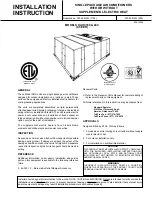
73
14.4 Airflow Direction
There is one type of airflow, vertical airflow (directed by horizontal vane).
Control of airflow direction can be automatic (angles of direction is determined by operation mode, heat
exchanger temperature and intake air temperature) and manual (angles of direction can be adjusted using
remote control).
14.4.1 Vertical
Airflow
Operation Mode
Airflow Direction
Upper Vane Angle (°)
1 2 3 4 5
Heating
Auto with Heat Exchanger
A
Upward fix
20
B
Downward
fix
58
Temperature C
Upward
fix
20
Manual
20 33 45 58 70
Cooling
Auto
20 ~ 70
Manual
20 33 45 58 70
Soft Dry
Auto
20 ~ 70
Manual
20 33 45 58 70
1.
Automatic vertical airflow direction can be set using remote control; the vane swings up and down within the angles as stated
above. For heating mode operation, the angle of the vane depends on the indoor heat exchanger temperature as Figure 1
below. When the air conditioner is stopped using remote control, the vane will shift to close position.
2.
Manual vertical airflow direction can be set using remote control; the angles of the vane are as stated above and the positions
of the vane are as Figure 2 below. When the air conditioner is stopped using remote control, the vane will shift to close
position.
14.4.2 Horizontal
Airflow
The horizontal airflow direction louver can be adjusted manually by hand.
14.5 Quiet Operation (Cooling Mode/Cooling Area of Dry Mode)
Purpose
o
To provide quiet cooling operation compare to normal operation.
Control
condition
o
Quiet operation start condition
When “QUIET” button at remote control is pressed twice.
QUIET LED illuminates.
o
Quiet operation stop condition
When one of the following conditions is satisfied, quiet operation stops:
QUIET button is pressed again.
Stop by OFF/ON switch.
Timer “off” activates.
When quiet operation is stopped, operation is shifted to normal operation with previous setting.
When fan speed is changed, quiet operation is shifted to quiet operation of the new fan speed.
When operation mode is changed, quiet operation is shifted to quiet operation of the new mode.
During quiet operation, if timer “on” activates, quiet operation maintains.
After off, when on back, quiet operation is not memorised.
A
C
B
Indoor Heat Exchanger
Temperature
58°C
50°C
Figure 1
30°C
37°C
Figure 2
All open
Swing
All close
Lower limit
Upper limit
1
2
3
4
5
















































